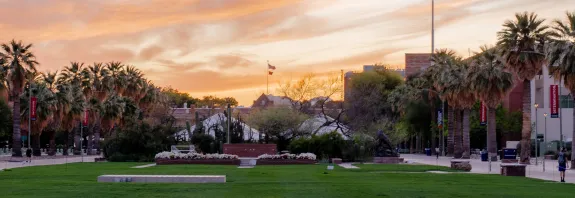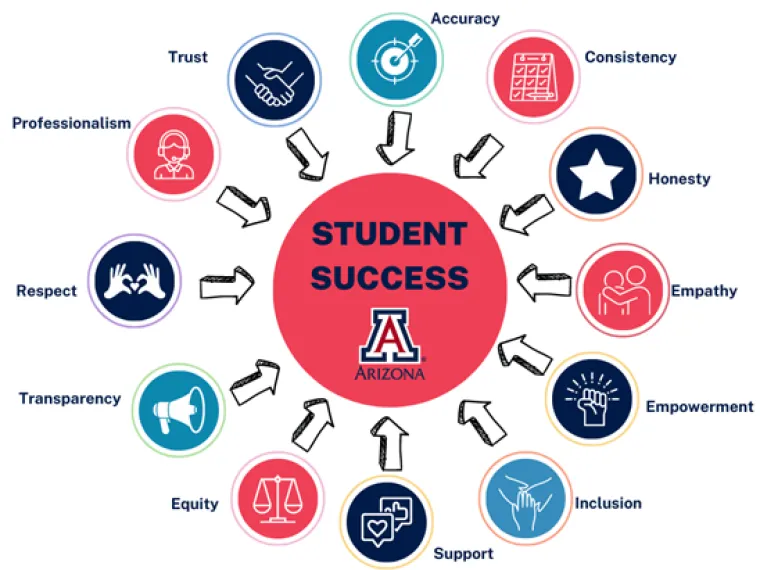
Academic Advising Mission, Vision, and Philosophy Statement
Mission Statement
We, the academic advisors of The University of Arizona, are educators who use a collaborative, proactive approach to provide accurate information that empowers students to navigate the university and define their success. We serve students, their support systems, department and campus colleagues, and the greater community through transparent and open communication. Our responsibilities as we support the institutional mission of retention, graduation, and overall student success are sharing relevant and timely information; explaining curriculum, policies, and processes; identifying resources; advancing equitable practices; advocating for students; and engaging in continuous training and development.
Vision Statement
We, the academic advisors of The University of Arizona, strive to maximize human potential, affirm a sense of belonging, and empower students and colleagues to thrive through partnerships grounded in the institutional mission of student success. As a community, we continuously examine, explore, and identify new theories, approaches, practices, and tools that will stimulate innovative ideas for interaction with students, colleagues, and partners. Driven by an equity-based lens, we champion future changes in policies and processes that promote development, growth, and readiness resulting in holistic student success.
Philosophy Statement
We, the academic advising community at The University of Arizona, are a university-wide network of academic advisors, academic advising directors, faculty advisors, campus colleagues, and peer advisors dedicated to empowering students to achieve their academic goals. As a community, we are bound by shared values to guide interactions with students, colleagues, faculty, campus partners, and members of the broader community. These values nurture student success and are shared in the image below.

These foundational values (accuracy, consistency, empathy, empowerment, equity, honesty, inclusion, professionalism, respect, support, transparency, and trust) guide our practice for academic advising to support our community and care for ourselves.
The practice of academic advising is collaborative, respectful, proactive, and driven by a student-centered orientation. We view students through a growth mindset lens; encouraging students to thrive on challenges by embracing their unique assets as a launch pad for developing new abilities, skills, and talents. The student experience is at the core of our field. Surrounding this core is an aspirational goal to create relationships and spaces committed to respect, trust, empathy, and inclusion for all stakeholders. We believe it takes the entire university community to fully support students as they achieve educational goals.
We serve as translators for the University of Arizona culture by explaining university and college policies for both advocacy and information purposes. We identify campus and community resources that promote growth, development, and wellness. Our practice requires a holistic view 3 of students to promote persistence and success leading to graduation as well as promoting institutional excellence.
As an academic advising community, we are influenced and informed by a variety of student development, identity-based, and learning focused theories. Academic advisors employ a variety of approaches, such as but not limited to appreciative advising, proactive advising, strengths-based advising, developmental advising as we engage as educators with students. Through kind and respectful partnerships with students, we build trust and tailor the experience to accommodate the unique needs of the student.
In addition to theories and scholarship, we employ technology as a tool for connecting advisors, students, and resources. Advisors leverage technology to document the student journey and provide customized support. Additionally, we encourage students to use technology for self advocacy and empowerment.
We, as educators, recognize the importance of on-going advisor development focused on relevant theories, approaches, models, and specific campus content, which is communicated through scholarly literature, campus resources, professional organizations, and other appropriate outlets. Through this learning-focused perspective, we continue to refine our practice, enhance the student experience at the University of Arizona, and educate stakeholders about the field of academic advising.
Goals:
As an institution, the goals of academic advising include helping students:
- clarify their life and career goals;
- develop suitable educational plans;
- select appropriate courses and complementary educational experiences;
- interpret institutional requirements;
- enhance their awareness of available educational resources (such as internship opportunities, honors, and tutoring programs);
- evaluate their progress toward established goals;
- assist them in completing degree requirements in a timely manner;
- develop decision-making skills;
- reinforce their self direction;
- seek out and use support services in the institution and the community;
- collect and distribute data regarding student needs, preferences and performance for use in making institutional decisions and policy.
Objectives of the ARC
The ARC was established by an Academic Advising Task Force convened in 2001. The ARC has five main objectives:
- Provide accurate and thorough referral services for students which enhance access to academic advising, counseling, and other student services they seek;
- Assist advisors in developing a working knowledge of the range of counseling and student services available to students, and answer questions they may have in assisting individual students;
- Provide a program of coherent and timely training and professional development for campus academic advisors;
- Collect and maintain data about advising practices nationally and at the university; and
- Consult with colleges and departments about aspects of good advising practices, recognition and rewards for advisors, and assessment of advising practices.
Academic Advising Task Force II was convened in 2010 and produced a second report identifying additional recommendations for strengthening academic advising at the UA (appendices).
